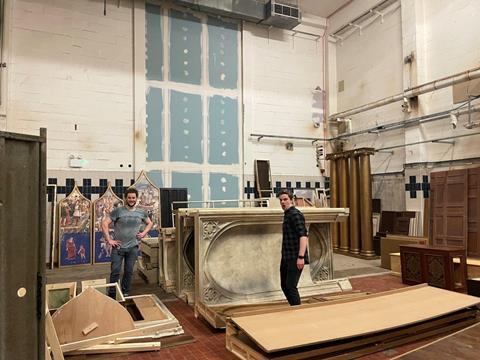More than 23 tonnes of scenery was rehoused, which, had it been sent to landfill, would have generated around 10 tonnes of CO2e.

Bristol’s Bottle Yard Studios has supported Film and TV sustainability consultancy Picture Zero in recycling the scenery and sets for BBC drama Wolf Hall: The Mirror & the Light.
The production team behind the six-part series were based in production offices at The Bottle Yard Studios while filming took place on location across England and Wales between December 2023 and April 2024.
Picture Zero arranged for the bulk of the scenery to go to The White Horse Military Show, a not for profit, community interest project based in Neston Park Estate in Wiltshire.
This included doors, stairs, columns, wall coverings and raw materials, all of which was used in their annual August show and is now also available to be used free-of-charge by local theatres and students.
Richard Dalton, production director at The White Horse Military Show says: “Using recycled sets like these from the film industry enables us to create new sets for our immersive living history festival run by volunteers from all walks of life. Over a 40-acre site we create environments for re-enactors, singers and historians to perform in – this year we had 26 sets in total. The sets will remain with us and go up again year after year.”
Film and TV Diploma students from boomsatsuma, the sixth-form college based on site at The Bottle Yard Studios, were invited to browse the storeroom and take smaller pieces for the making of their horror short filmmaking projects. Meanwhile, fabric offcuts were dropped off to The Bristol Bike Project to use as oil rags. The community programme based in Easton provides free bikes to people in and around the city.
Lisa Osborne, producer of Wolf Hall: The Mirror and the Light, said: “As our industry grapples with the overlapping challenges of climate change and resource depletion, it is more important than ever to tackle our consumption excesses and reduce waste. Having worked with them before on Becoming Elizabeth in 2020-22, I knew that The Bottle Yard would be enthusiastic partners in helping us to minimise waste on Wolf Hall: The Mirror and the Light and was delighted when Picture Zero stepped in to help co-ordinate our efforts. Together they made the whole process straightforward and collaborative.”
Lily Limmer, sustainability manager at Picture Zero, added: “From the outset, the producers were clear they wanted to donate and rehome as much scenery as possible. Usually we’d arrange for scenery and sets to be kept on the stages for a few days post-wrap, to give theatres, charities and schools enough time to come and collect pieces from a centralised store. However, Wolf Hall: The Mirror & the Light was shooting entirely on location. Production headquarters were based at The Bottle Yard Studios, but no stage space had been hired. The locations that filming was taking place at were often very remote, and there was no realistic way we could have arranged collections from them.
“Sharing our sustainability ethos to help productions reuse and recycle wherever possible, The Bottle Yard Studios agreed to provide a storage space on-site. This was a game changer. We were able to transport all scenery back to Bristol and had plenty of time to arrange collections. All in all, we rehomed over 23 tonnes of scenery, which, had it been sent to landfill, would have generated around 10 tonnes of CO2e.
“We simply couldn’t have done this without the support of The Bottle Yard’s staff, the production and construction teams. Our construction company JW Creative arranged the transportation of pieces free of charge to support our sustainability mission.”
Katherine Nash, business & operations manager and sustainability lead at The Bottle Yard Studios, said: “We see it as part of our role to support productions to work sustainably, and sometimes that requires flexibility and collaboration to find ‘workarounds’ to problems. It’s great to see more productions bringing experts like Picture Zero on board. On this occasion we thankfully had space to provide the storage that was needed to meet the team’s sustainability goals, and we did so with the knowledge that local organisations would benefit from reusing these materials. Drama is the highest CO2-emitting genre in film and TV production, so we’re always looking for ways to help productions reduce environmental impact.”




No comments yet